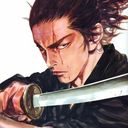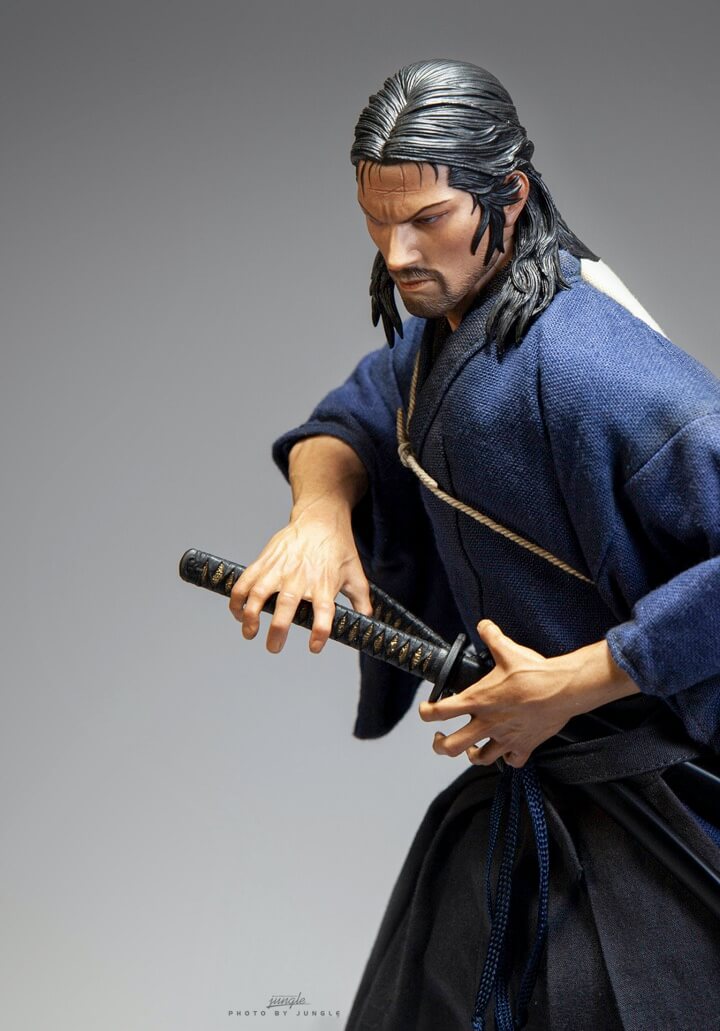
He was apparently trained by Munisai in the sword, and in the family art of the jutte. This education is possibly the basis for Yoshikawa Eiji‘s fictional education of Musashi by the historical Zen monk Takuan. Both Dorin and Tasumi, Musashi’s uncle by marriage, educated him in Buddhism and basic skills such as writing and reading. Regardless of the truth about Musashi’s ancestry, when Musashi was seven years old, the boy was raised by his uncle, Dorinbo (or Dorin), in Shoreian temple, three kilometers (~1.8 mi.) from Hirafuku. Kenji Tokitsu prefers to assume a birth date of 1581, which avoids the necessity of assuming the tombstone to be erroneous (although this poses the problem of from whom then Musashi received the transmission of the family martial art).They divorced, as in the second theory, but Yoshiko took Musashi, who was 7 at the time, with her, and married Tasumi Masahisa. A variant of this second theory is based on the fact that the tombstone states that Omasa gave birth to Musashi on 4 March 1584, and died of it.During his childhood, he went to Hirafuku to find his real mother. The second wife of Tasumi Masahisa was the mother of Miyamoto Musashi. The daughter of Bessho Shigeharu first married Hirata Muni and was divorced from him a few years later. This second scenario is laid out in an entry to the Tasumi family’s genealogy. Musashi grew up treating Munisai’s second wife, Omasa (daughter to Lord Shinmen) as his mother. Munisai divorced her after Musashi’s birth, whereupon she decamped for her father’s house, leaving Musashi with Munisai. Musashi, then, was born to Munisai’s first wife, Yoshiko (daughter to Bessho Shigeharu, who formerly controlled Hirafuku village until he lost a battle in 1578 to Yamanaka Shikanosuke). Munisai lived a good deal longer, later than 1590 possibly. Omasa, Munisai’s widow, was not Musashi’s biological mother. He died in 1580, leaving two daughters and son Iori his wife adopted a recently born child, from the Akamatsu clan, intended to succeed Munisai at his jitte school. There is considerable uncertainty surrounding Munisai, such as when he died and whether he was truly Musashi’s father, and even less is known about Musashi’s mother. Kenji Tokitsu has suggested that the accepted birth date of 1584 for Musashi is wrong, as it is primarily based on a literal reading of the introduction to The Book of Five Rings where Musashi states that the years of his life “add up to 60” (yielding the twelfth year of the Tensho era, or 1584, when working backwards from the well-documented date of composition), when it should be taken in a more literary and imprecise sense, indicating not a specific age but merely that Musashi was in his sixties when he wrote it. Further confounding his birthdate, the genealogy of the extant Miyamoto family recounts Musashi was born in 1582. Munisai’s tomb says he died in 1580, which conflicts with the commonly accepted birth date of 1584 for Musashi. “ Fujiwara” was the lineage from which Musashi claimed descent. As for “Musashi,” Musashi no Kami was a court title, making him the nominal governor of Musashi province. Hirata was relied upon by Lord Shinmen and so was allowed to use the Shinmen name.
#Musashi miyamoto star pupil fanfiction full#
Musashi gives his full name and title in The Book of Five Rings as Shinmen Musashi-no-Kami Fujiwara no Harunobu 新免武蔵守藤原玄信 His father, Shinmen Munisai (新免無二斎) was an accomplished martial artist and master of the sword and jutte also jitte Munisai, in turn, was the son of Hirata Shōgen (平田将監), a vassal of Shinmen Iga no Kami, the lord of Takayama Castle in the Yoshino district of Mimasaka Province. Niten Ki (an early biography of Musashi) supports the theory that Musashi was born in 1584: “He was born in Banshū, in Tenthe Year of the Monkey.” The historian Kamiko Tadashi, commenting on Musashi’s text, notes: “Munisai was Musashi’s father…he lived in Miyamoto village, in the Yoshino district of Mimasaka Province Musashi was most probably born here.” His childhood name was Bennosuke 弁之助

Musashi himself simply states in The Book of Five Rings that he was born in Harima Province.


The details of Miyamoto Musashi’s early life are difficult to verify. He was the founder of the Hyōhō Niten Ichi-ryū or Niten-ryū style of swordsmanship and in his final years authored The Book of Five Rings ( 五輪の書 Go Rin no Sho), a book on strategy, tactics, and philosophy that is still studied today. Musashi, as he was often simply known, became renowned through stories of his excellent and unique double-bladed swordsmanship and undefeated record in his 60 duels (next is 33 by Itō Ittōsai). 1584 – June 13, 1645, also known as Shinmen Takezō, Miyamoto Bennosuke or, by his Buddhist name, Niten Dōraku, was an expert Japanese swordsman and rōnin.


 0 kommentar(er)
0 kommentar(er)
